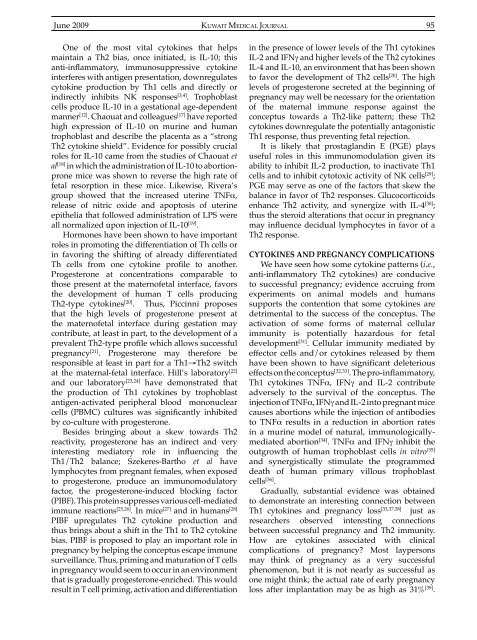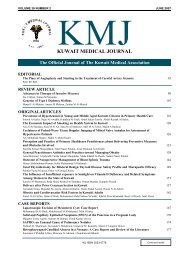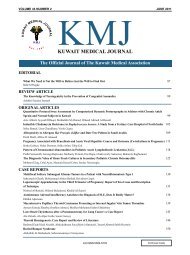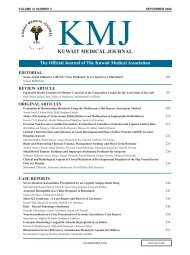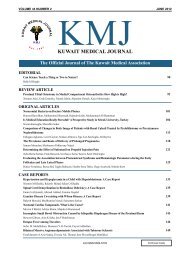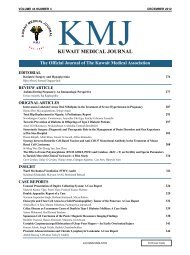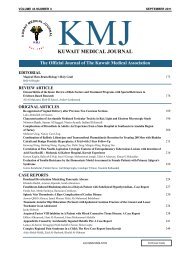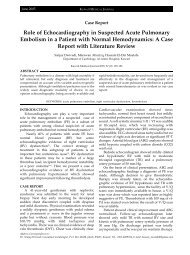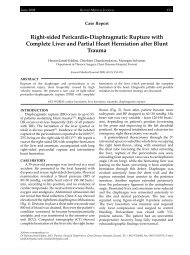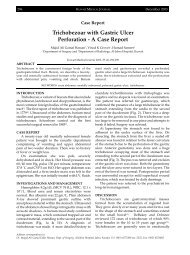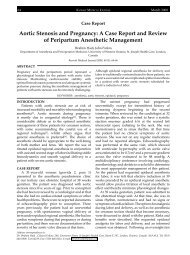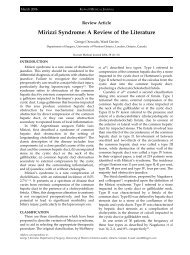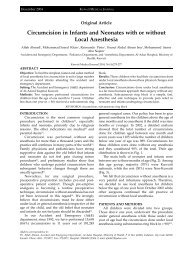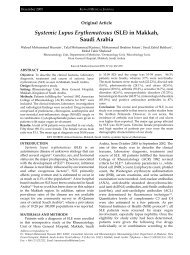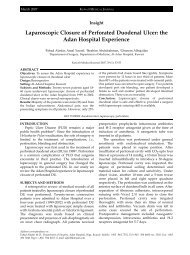June 09-41-2.indd - Kma.org.kw
June 09-41-2.indd - Kma.org.kw
June 09-41-2.indd - Kma.org.kw
Create successful ePaper yourself
Turn your PDF publications into a flip-book with our unique Google optimized e-Paper software.
<strong>June</strong> 20<strong>09</strong>KUWAIT MEDICAL JOURNAL 95One of the most vital cytokines that helpsmaintain a Th2 bias, once initiated, is IL-10; thisanti-inflammatory, immunosuppressive cytokineinterferes with antigen presentation, downregulatescytokine production by Th1 cells and directly orindirectly inhibits NK responses [3,4] . Trophoblastcells produce IL-10 in a gestational age-dependentmanner [12] . Chaouat and colleagues [17] have reportedhigh expression of IL-10 on murine and humantrophoblast and describe the placenta as a “strongTh2 cytokine shield”. Evidence for possibly crucialroles for IL-10 came from the studies of Chaouat etal [18] in which the administration of IL-10 to abortionpronemice was shown to reverse the high rate offetal resorption in these mice. Likewise, Rivera’sgroup showed that the increased uterine TNFα,release of nitric oxide and apoptosis of uterineepithelia that followed administration of LPS wereall normalized upon injection of IL-10 [19] .Hormones have been shown to have importantroles in promoting the differentiation of Th cells orin favoring the shifting of already differentiatedTh cells from one cytokine profile to another.Progesterone at concentrations comparable tothose present at the maternofetal interface, favorsthe development of human T cells producingTh2-type cytokines [20] . Thus, Piccinni proposesthat the high levels of progesterone present atthe maternofetal interface during gestation maycontribute, at least in part, to the development of aprevalent Th2-type profile which allows successfulpregnancy [21] . Progesterone may therefore beresponsible at least in part for a Th1→Th2 switchat the maternal-fetal interface. Hill’s laboratory [22]and our laboratory [23,24] have demonstrated thatthe production of Th1 cytokines by trophoblastantigen-activated peripheral blood mononuclearcells (PBMC) cultures was significantly inhibitedby co-culture with progesterone.Besides bringing about a skew towards Th2reactivity, progesterone has an indirect and veryinteresting mediatory role in influencing theTh1/Th2 balance; Szekeres-Bartho et al havelymphocytes from pregnant females, when exposedto progesterone, produce an immunomodulatoryfactor, the progesterone-induced blocking factor(PIBF). This protein suppresses various cell-mediatedimmune reactions [25,26] . In mice [27] and in humans [28]PIBF upregulates Th2 cytokine production andthus brings about a shift in the Th1 to Th2 cytokinebias. PIBF is proposed to play an important role inpregnancy by helping the conceptus escape immunesurveillance. Thus, priming and maturation of T cellsin pregnancy would seem to occur in an environmentthat is gradually progesterone-enriched. This wouldresult in T cell priming, activation and differentiationin the presence of lower levels of the Th1 cytokinesIL-2 and IFNγ and higher levels of the Th2 cytokinesIL-4 and IL-10, an environment that has been shownto favor the development of Th2 cells [20] . The highlevels of progesterone secreted at the beginning ofpregnancy may well be necessary for the orientationof the maternal immune response against theconceptus towards a Th2-like pattern; these Th2cytokines downregulate the potentially antagonisticTh1 response, thus preventing fetal rejection.It is likely that prostaglandin E (PGE) playsuseful roles in this immunomodulation given itsability to inhibit IL-2 production, to inactivate Th1cells and to inhibit cytotoxic activity of NK cells [29] ;PGE may serve as one of the factors that skew thebalance in favor of Th2 responses. Glucocorticoidsenhance Th2 activity, and synergize with IL-4 [30] ;thus the steroid alterations that occur in pregnancymay influence decidual lymphocytes in favor of aTh2 response.CYTOKINES AND PREGNANCY COMPLICATIONSWe have seen how some cytokine patterns (i.e.,anti-inflammatory Th2 cytokines) are conduciveto successful pregnancy; evidence accruing fromexperiments on animal models and humanssupports the contention that some cytokines aredetrimental to the success of the conceptus. Theactivation of some forms of maternal cellularimmunity is potentially hazardous for fetaldevelopment [31] . Cellular immunity mediated byeffector cells and/or cytokines released by themhave been shown to have significant deleteriouseffects on the conceptus [32,33] . The pro-inflammatory,Th1 cytokines TNFα, IFNγ and IL-2 contributeadversely to the survival of the conceptus. Theinjection of TNFα, IFNγ and IL-2 into pregnant micecauses abortions while the injection of antibodiesto TNFα results in a reduction in abortion ratesin a murine model of natural, immunologicallymediatedabortion [34] . TNFα and IFNγ inhibit theoutgrowth of human trophoblast cells in vitro [35]and synergistically stimulate the programmeddeath of human primary villous trophoblastcells [36] .Gradually, substantial evidence was obtainedto demonstrate an interesting connection betweenTh1 cytokines and pregnancy loss [33,37,38] just asresearchers observed interesting connectionsbetween successful pregnancy and Th2 immunity.How are cytokines associated with clinicalcomplications of pregnancy? Most laypersonsmay think of pregnancy as a very successfulphenomenon, but it is not nearly as successful asone might think; the actual rate of early pregnancyloss after implantation may be as high as 31% [39] .


